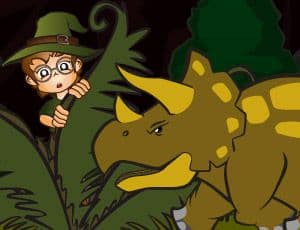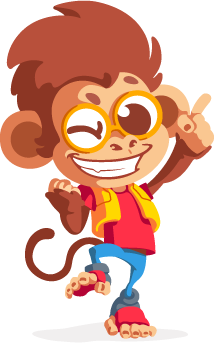Teacher's support sheet

The Age of Dinosaurs
Our hero has returned to prehistory to rescue the calendar sheets.
Help him rescue them by answering the calendar questions and live a great adventure in the age of dinosaurs.

Teacher's tips
Level of education: Elementary School
Age: 06 to 09 years old
The use of the calendar is essential in our daily lives. It is important because it helps us organize the activities that we have to carry out throughout the days and months of the year, it guides us on what the holidays of the year will be, tests, vacations, our birthday, etc. Learning to use the calendar is essential to understand and interpret all these dates. The purpose of this game is to teach this theme in a playful and relaxed way.
Learner outcomes
Recognize the calendar (day, month and year) as fundamental in people's daily lives;
Realize how many days make up a week, a month a year (study of numbers);
Learning about how numbers work in a specific context: the calendar;
List and identify time measurement units – day, week, month and year;
Build the notion of counting and sequence of days of the week, highlighting the succession and duration of time;
Establish a relationship of everyday events between today, yesterday and tomorrow;
Understand and relate time measurement units in the social context;
Recognize the meaning of the words: bimester, quarter, semester and leap year;
Recognize the measurement and organization of time: days, months, years, decades and centuries;
Understand the calendars that have been created throughout history;
Participate in resolutions of problem situations involving days, months and years;
Teachers' goals
Lead the student to perceive the succession and duration of time, through the counting and sequence of days, weeks, months and years;
Recognize that the calendar is part of our life;
Work motor coordination;
Propose the use of numbers in different contexts;
Fix content worked in the classroom;
Introduce students to different ways of measuring time;
Show students the importance of the calendar;
Suggestions of approaches for the teacher
(Suggestion 1) The game can be proposed individually or in pairs. Children should be encouraged to exchange ideas to find the correct answer. The notion that each event takes place in its time is gradually conquered by the children, but the teacher can and should provide experiences in which the students experience the social use of the measure of time.
(Suggestion 2) To complement the work developed by the game “Era dos Dinossauros”, we suggest fixing the calendar of the month on the wall of the classroom, to accompany the students on a daily basis. If you prefer, use a calendar that has all the months of the year.
(Suggestion 3) Draw up a collective calendar with the date of birth of all students. Ask students to follow the calendar daily so they don't forget any classmate's birthday.
(Suggestion 4) Work in an interdisciplinary way with the science teacher introducing the students to the lunar calendar.
(Suggestion 5) Ask students to build a sundial.
(Suggestion 6) Ask students to invent a calendar according to the most important events in their lives.
More about the content
- It is very important to establish a daily routine in which the class starts, always asking the class: what day is it today? Which day of the week? What is the month?
In the course of this work, add new questions to the children, as a way of exploring and working with the calendar:
What day of the month was it yesterday? And what day of the week?
Tomorrow, what day will it be?
How many days are left for this month to end?
What is the last day of the week for this month?
Tomorrow it will be another month, what's his name?
How many days are left until our Festa Junina arrives?
- It is important to mark on the calendar, with the help of the children, important dates for the class: school parties, birthdays of the month, among others.
Other problem-situations may be proposed, based on the plays in this game:
What other month has the same number of days as this one?
What day of the week did this month start on?
Look at the last day of this month. What day of the week will the next month start on? What month is this?
If today is the 3rd Wednesday of the month, what day is it?
There are 48 hours left for Saturday. How many days left?
The parent meeting will take place on the 30th. How many days are left?
Luísa has a birthday on the 5th day of the month and Samuel has a birthday 18 days after Luísa. What day is Samuel's birthday?
How many weeks does this month have?
How many days of classes will we have this month?
Observing the month that appears on the move, write the names of the months that come before and after this one.
It is interesting to decorate the room with well-illustrated calendars and use them daily, always highlighting birthdays, important activities in the context of the school and regional holidays. The more the student uses the calendar in his day to day life, the better he will learn about the subject.
Check out another BEST SCHOOL GAME that works on the same theme.
Magic Calendar
